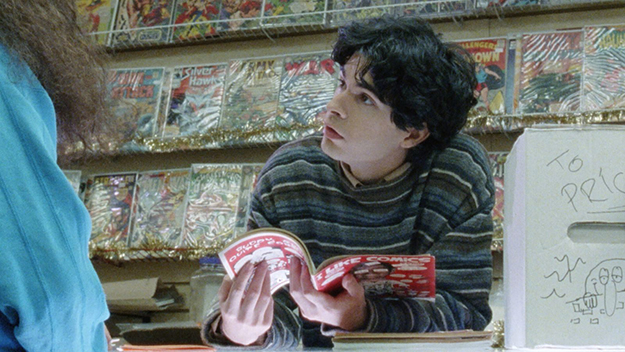Review: Funny Pages
This article appeared in the September 8, 2022 edition of The Film Comment Letter, our free weekly newsletter featuring original film criticism and writing. Sign up for the Letter here.

Funny Pages (Owen Kline, 2022)
There’s an anachronistic feel to Owen Kline’s Funny Pages, which follows an aspiring 17-year-old cartoonist, Robert (Daniel Zolghadri), as he leaves his suburban comfort to pursue a life of real grit and hone his artistic chops on the outskirts of Trenton, New Jersey. The movie is set in the present day, yet the cartooning world it depicts is firmly that of the 1990s.
A lot has happened in comics in the last three decades. Today, the majority of aspiring cartoonists at the School of Visual Arts in New York are women; there’s been an explosion of Japanese comics and international webcomics; seemingly every bookstore now has graphic novels, young-adult comics, art comics, nonfiction comics, experimental comics, and everything in between. But Kline’s movie feels like it takes place in some alternate reality, dominated by the snarky male back-issue “bin divers” of yesteryear, and devoid of anything and anyone that doesn’t support this retrograde vision. The cartoonist played by Anders Danielsen Lie in Joachim Trier’s The Worst Person in the World, who is questioned about the sexism of his comics, is more like the present-day cartoonists I know than those depicted in Funny Pages.
Besides a few odd outbursts of violence, Funny Pages deploys the same circa-1991 archetypes of Daniel Clowes’s Art School Confidential (adapted for the screen in 2006 by Crumb and Ghost World filmmaker Terry Zwigoff) that appeared alongside other comics about snotty aspiring cartoonists (like Dan Pussey) in Clowes’s long-running series, Eightball. To begin with, Robert’s parents strongly disapprove of his career choice. Considering the massive sway of comic books in popular culture—among both the young and old—for well over a decade, wouldn’t it have been more relevant and refreshing if the parents were comic fans, or even cosplayers? Then the kid might have rebelled in a different way, maybe by arguing that his parents’ tastes are childish!
This movie is so 1990s that Robert’s troubled mentor, Wallace (Matthew Maher), is an Image Comics artist who touts his “craft” over the “soul” of the teen’s goofy cartoons (drawn by real-life cartoonist Johnny Ryan). This conflict recalls the famous (among cartoonists) debate set off by James Kochalka’s letter to the editor in a 1996 issue of The Comics Journal, titled “Craft is the Enemy,” which posited that craft stifled creativity. Others (including Frank surrealist Jim Woodring) pushed back, asserting that craft was a means of unlocking the “soul” of the artist. Rather than recognize the “soul” in the weird Mannerist figuration of Image Comics (currently celebrated by alternative cartoonists on the Cartoonist Kayfabe YouTube channel), not to mention the obviously extraordinary “craft” of Johnny Ryan’s tight open shapes and rigorous remixing of lowbrow humor, Funny Pages celebrates Kochalka’s contrarian stance without any characterizations that might update its decades-old mold.
If conceptually out-of-date, Funny Pages is nonetheless visually compelling. Clowes’s comics have been adapted for the screen multiple times, but never with the aesthetic treatment his drawings deserve. Funny Pages succeeds in vividly translating the sublimely ugly-beautiful characters, crummy locations, and slightly off-register colors of a particular strain of alternative comics into a live-action film. Never have photographed close-ups (by DPs Sean Price Williams and Hunter Zimny) felt so much like Drew Friedman drawings: pimpled cheeks seem rendered by Friedman’s attentive stippling technique. Every background character, with their exhausted and agitated demeanor, looks like they walked out of a Rick Altergott panel. In one scene, as Robert sits with Wallace in a parked car outside a Rite Aid, the fidgety Maher and the tightness of the shots conjure an intimacy akin to that of George Kuchar’s video diaries. The color combinations in the film have a true contrarian spirit in their unexpected, drab lusciousness—a pale blue shirt glows against an oatmeal-white wall. The pace and structure of the movie, meandering and episodic with occasional bursts of activity, faithfully evoke collections of strips that were originally meant to be read months apart, then stitched together into a single binding. Characters appear and reappear, all drawn with consistency.
This formal freshness is dulled by the movie’s dated content, but I have a hunch as to why we’re back in the 1990s. The world as it is is too horrifying and confusing. The ’90s “alternative” did not mean alt-right. Back then, the pioneer of alternative comics, Robert Crumb, was still synonymous with counterculture, not misogyny. A goofy cartoon frog, Pepe, from a comic (appropriately) titled Boy’s Club is now a hate symbol. Yet the relentless self-examination in Crumb’s work asks more from us. Crumb would have had these characters question why they want to bury their heads in the past. By existing in its own time warp, Funny Pages avoids this crucial question.
Dash Shaw is a cartoonist and animator, most recently of 2021’s Discipline (New York Review Comics) and Cryptozoo (Magnolia Pictures).







